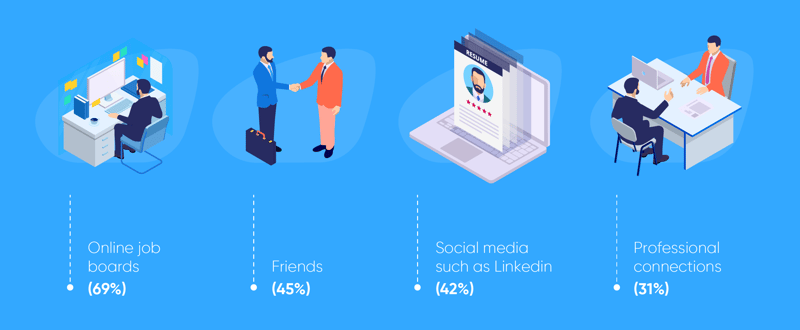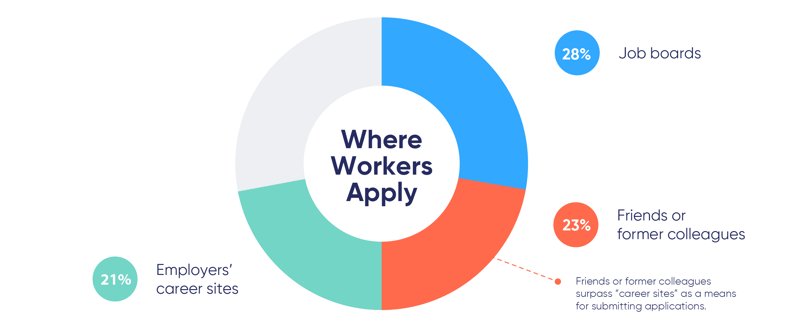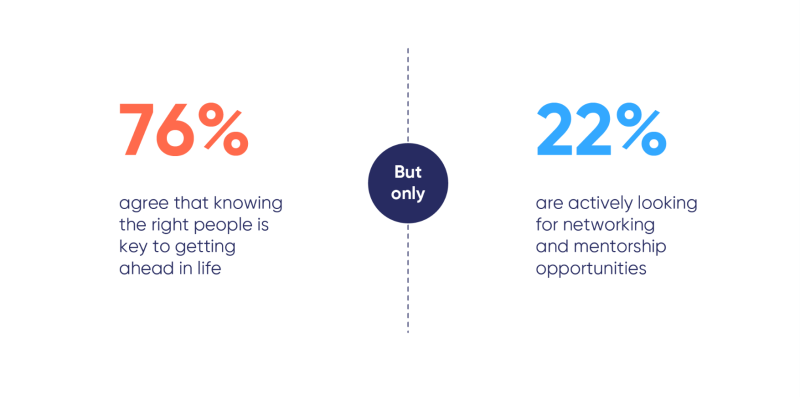

Why is networking so important? Building connections with the right people at the right time could be the key to taking your career to the next level.
What is networking?
Networking usually involves meeting new people, who share a profession, industry, or interests. Networking involves exchanging ideas and information between these individuals.
Unrelated to computer networking, professional networking often takes place in informal settings. For example, networking can happen at events, your office, or through industry associations. However, it can also be done formally by connecting with specific individuals that you want to meet via email, LinkedIn, or other methods.
That said, if walking into a room full of strangers feels like your worst fear, you’re not alone. Many people do their best to avoid networking altogether, but this attitude can be very detrimental to your success. Read on to learn what networking is, why it’s crucial for your career success, and how to network well.
Networking is important, but it doesn’t have to be as intimidating as you think.
What does networking mean?
If you want to reap the benefits of networking, it’s important to know what networking is and what it isn’t. First of all, professional networking has no relation to computer networking.
At its core, the kind of networking we’re discussing is about meeting new people. However, what sets networking apart from casually meeting someone new on a night out is your intention.
Networking often occurs in a business casual setting. This can be in the office or at a happy hour. Networking can also happen at an event specifically for networking. Ultimately, the goal is for professionals to connect and help each other grow in their careers.
Networking can occur with your co-workers, both on and off your team. Networking can also happen with old friends or complete strangers. Really, it’s all about having the intention to support your own (and other people’s) career paths.
Why is networking important?
Using your network is one of the best ways to find a new job or even a new role at your current company. Why is networking so important? It often comes down to one keyword: referrals.
Thirty-one percent of job seekers find listings through professional connections, especially referrals. Networking can open doors to new opportunities that might be out of reach otherwise.
Plus, a strong professional relationship can inspire someone to hand-deliver your resume to the hiring manager’s desk. This can make you stand out from the crowd and even help you land your dream job one day.

Many people assume that networking is only useful during a job search. But, the purpose of networking goes far beyond finding your next job opportunity.
4 reasons networking is important to your career development
There’s no denying that meeting new people can feel uncomfortable. However, if you can face your fears, you’ll be amazed by the connections you can make with co-workers, old friends, and yes, even strangers.
Here are 4 reasons why networking is important to your career development:
- Networking contributes to your social well-being
- Networking leads to the exchange of ideas
- Networking helps you meet people at all professional levels
- Networking boosts your professional confidence
Networking contributes to your social well-being
Networking can increase your social well-being and help you develop lifelong friends. You might be focused on the professional aspect of networking. However, many friendships have started in the workplace or at professional functions.
Networking isn’t just about taking — it’s also about giving, which makes it fertile ground for friendship. Having more people in your life can help you meet your new best friend and increase your overall happiness.
Why is networking important? Besides the social benefits, building relationships can be the key to making huge strides in your career path.
Even if you aren’t looking for a job right now, networking can bring interesting and relevant opportunities your way, especially for women.
A personal or LinkedIn connection may reach out about a role that’s perfect for you. They could also ask for your help to pursue a passion project. When people know what you’re interested in, they can help you find opportunities that you may have otherwise missed. You might even find your next mentor or business partner through networking.
According to Jobvite, 23% of people submit resumes through friends or former colleagues. This makes it clear why staying connected is so important. Building your network not only helps you find new opportunities, but it can help you secure a new role, too. The importance of referrals can’t be denied.

Networking leads to the exchange of ideas
New ideas can keep you growing professionally and trying new things. Hearing what other people are doing at their companies can also inspire you to bring new techniques or skills to your job. Whether you work for a small business or a large corporation, your fresh ideas can help you stand out and succeed in your current role.
Discussing your work with new connections offers a unique perspective. It also enhances motivation and creative thinking. Having an industry mentor or connection outside your company is a valuable asset.
If you’re feeling stuck on a project, a brainstorming session with someone in your network can help get the gears turning. For example, if you’re a small business owner, sharing your struggle with fellow business owners can help you problem-solve faster. This exchange of information is at the heart of networking.
Networking helps you meet people at various professional levels
Accessing higher-ups can be difficult in some organizations. This is where networking can introduce you to more experienced professionals. The opportunity to access their wisdom and career advice is key to your future growth.
These connections present new opportunities for mentorship and career development. This is why networking is so important. It also empowers you to share your skills. Professional networking with a co-worker who you admire can lead you to find a new mentor. It just takes a quick coffee or small talk at industry and networking events.
Knowing people of various professional levels can also expose you to a wider variety of job opportunities. Once you develop a relationship with someone, you may be able to leverage their connections to get a foot in the door for a new role. This is why networking is so important.
Networking can make you more confident
Professional networking is an exercise in confidence, especially for people who are shy or introverted. That’s part of why so many people avoid it. However, once you find yourself discussing your shared interests with a new friend, you’ll see that networking isn’t so bad.
Networking events are actually a great place to practice your confidence, even if you’re an introvert. Put yourself out there and speak about what matters to you. Developing new relationships helps you foster newfound confidence in your professional capabilities.
It can also help you gain confidence when it comes to social networking. Learning to face your fears in order to further your career can make meeting new friends less intimidating.
How to network if you’re shy
The purpose of networking is to make new friends, industry acquaintances, and even business partners. Through these new relationships, you can make progress on your career path quickly. When you look at it that way, it’s clear why networking is such a powerful tool — for introverts, too.
Here are a few ways to network if you’re shy:
- Start small: sometimes, just showing up to a networking event can be an accomplishment. Challenge yourself to attend the event and grab a drink, even if you don’t talk to anyone at first. Chances are, someone will approach you, and you’ll find yourself networking in no time!
- Bring a friend: a friend who understands your shyness can be the bridge you need to make your first new professional connection. Your friend can help start the conversation and give you the confidence to venture out on your own next time.
- Focus on shared interests: try finding a smaller networking event that allows you to focus on a specific interest you love talking about. You will likely find it easier to talk to new friends about something you’re truly passionate about.
Once you start, you’ll quickly see why networking is so important. You might even find it’s fun, too!
4 networking basics and best practices
Networking is personal. Forming a new relationship involves dedicating time to making connections. Finding ways that you feel comfortable getting to know someone will set you up for success.
Some people thrive at a large event, while others prefer to meet through networking apps like Shapr or LinkedIn. For some, virtual networking events can take some pressure off your first networking experience.
Even when people were quarantined at home in 2020, 6.3 million people attended virtual events on LinkedIn. This shows how powerful the drive to connect can be.

However, you can’t just show up to a networking event and expect to magically build a strong professional network. Here are four strategies to help you focus your networking efforts.
1. Consider what you have to offer
Effective networking is always a two-way street. Some people may avoid networking because they’re not sure what they have to offer.
Before you go to a networking event, consider what you can give to someone else and what you’re willing to offer. You may be eager to connect people with others in your network. But recognize ahead of time if you don’t feel comfortable recommending someone you just met for a job.
Defining what you can give and your boundaries can help you feel less unsure about networking. When you feel more comfortable, it’s easier to build trust with other people, too.
2. Let curiosity lead the way
Forget collecting a ton of business cards. Instead of aiming to meet as many people as possible, make a goal to have a few deep and engaging conversations with a handful of people. Focus on shared interests and let curiosity be your guide.
Getting people talking about what they care about can help you build a stronger connection. Ask a lot of questions and listen. Be open about your passions, goals, and interests, too.
Most importantly, don’t forget to follow up afterward. When you connect on LinkedIn or reach out by email, share something interesting you learned from the person.
3. Set bigger goals
If you’re looking for a job, there’s no need to ask everyone if they’re hiring.
Networking can feel sleazy if you’re only out for your own benefit. Instead, create networking goals bigger than yourself to avoid becoming intimidated or demanding. Remember that connections you make today can help you two, three, or ten years from now. Keep that in mind – almost every new connection you make will have value now or in the future.
Your higher goal can be learning, contributing to your industry, or something else completely. Either way, having a higher purpose can take the focus off you. Keep that higher goal top of mind to maintain your confidence and drive.
4. Find common ground
Remember, everyone at a business networking event is a person, too.
Treating everyone like their professional title can make a conversation awkward. While it may seem like that person is miles away from where you are, you might discover that you have more in common than you thought.
Have general questions prepared to ask about people’s interests beyond their work life. Connecting over hobbies can help you create a deeper bond.
How can you become good at networking?
While the fundamentals of business networking are simple, it does take practice to be a good networker. As your network grows, your techniques for supporting your network should, too.
Why is networking so important? The stronger your network is, the better you’re likely to feel about your career prospects. With 76% of people saying you need to know the right people to get ahead, the connection between your network and your net worth shows.

With that said, LinkedIn’s research shows that 51% of people struggle to overcome their underwhelming network. That’s why you need the right skills to take your networking to the next level.
Here are some powerful ways you can improve your networking habits.
Choose who you want to develop a relationship with
Networking is all about forming relationships, but most relationships don’t become close after one meeting. Choosing who to follow up with can help you create warmer connections.
But, don’t just choose the people with the best titles. Remember who you shared common interests with and invite them for a coffee or video chat to build the connection.
Offer opportunities to your network
When you see a job listing or an article that someone you networked with would find interesting, share it. Be proactive about sharing information and opportunities with your network, even before they ask. They may even start to reciprocate.
According to Jobvite, 66% of satisfied employees are eager to refer people in their network to work at their company. If that’s you, then sharing opportunities in your company can ensure you get to work with people you already know and like.

(Image source)
Network everywhere
Find new places to meet people with intention. Attending events and striking up conversations with confidence can help build your network wherever you go.
Whether you’re at a coffee shop, in an elevator, or in line at the grocery store, you can find a networking opportunity. Aim to discover something new and be open to connecting with new people no matter where you are.
Work on your body language
Body language plays a significant role in how we communicate and network. Shifting your body language to be more inclusive and welcoming can help make you a master networker.
For example, instead of crossing your arms, keep your body open and your arms at your sides. This unspoken signal helps build trust and shows people you’re open to connection.
Become an expert networker
Networking may have seemed like a necessary evil in the past. With these tools, though, you can now create meaningful and impactful relationships everywhere you go. Practicing your networking skills can help you become more confident and help you meet new, interesting people.









You must be logged in to post a comment Login